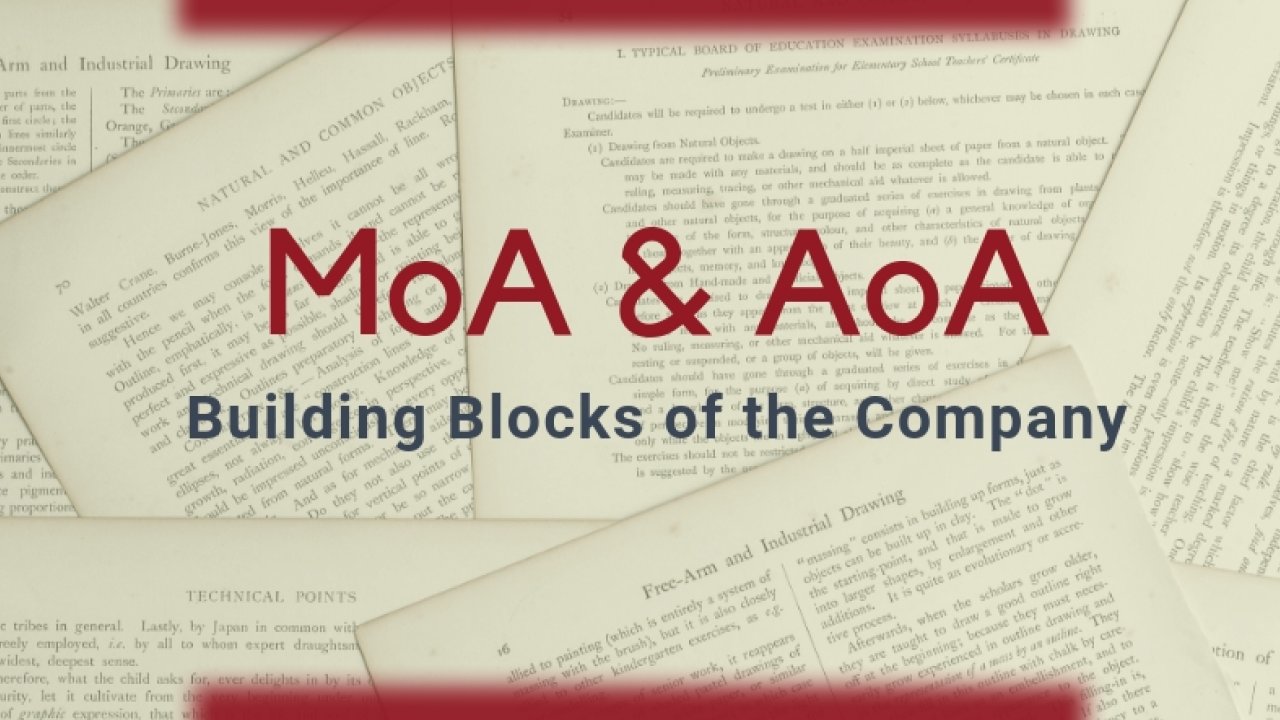What are Memorandum of Association and Articles of Association?
This article elucidates the significance and distinctions between a Memorandum of Association (MOA) and Articles of Association (AOA) in the context of company incorporation and governance. The MOA serves as the foundational document, encapsulating essential details for the company's establishment, while the AOA outlines the internal rules and regulations governing its management. The article delves into the key clauses within the MOA, including the Name, Registered Office, Object, Liability, Capital, and Subscription clauses. Additionally, it explores the entrenchment concept in the Articles, which restricts certain modifications to require a more intricate process than a regular resolution.

Introduction:
A Memorandum of association (MOA) and articles of association (AOA) are two essential documents for the incorporation and functioning of a company. The MOA contains all the information needed to incorporate a business. AOA, on the other hand, outlines the guidelines that a business must adhere to. These documents are essential, and they continue to be the foundation of your organization. Therefore, the company owner or the board of directors of an organization must draw up these two documents with the utmost precision and clarity. They won't be able to register your business if there is any error.
Memorandum of Association :
A Memorandum of Association (MOA) is the primary document that exhibits the structure of a company and contains all the information related to the company's incorporation. The charter of a company is another name for this MOA. This outlines the goals for which the company will operate, establishes the parameters of its authority, and establishes how the company will interact with the outside world.
A "memorandum" is defined as the original memorandum of association that a company registered or an amended one that complies with the requirements of the Companies Act, 2013, Section 2 (56).
The following are the clauses contained in a MOA :
- Name Clause – The distinct name of the company is included in this clause. A public company’s name has the suffix, public limited whereas a private company has the suffix, private limited.
- Registered Office Clause – The company is required to have a registered office to which all communications are sent.
- Object Clause – The clause states the object and purpose of the company.
- Liability Clause - It outlines the liabilities of the company's members. Members' liability in an unrestricted company is unlimited, but in a company with shares, it is constrained by the amount still owed on each member's share. In a corporation limited by guarantee, the sum that each partner has promised to pay restricts the members' liability.
- Capital Clause - It outlines the share capital invested, the total number of shares that are registered, and how the shares are divided. In the case of a one-person business, the founder also joins as a shareholder of the organization.
- Subscription Clause - Each subscriber to the company's memorandum must purchase at least one share of the business.
Articles of Association :
According to the Companies Act of 2013, each company's articles of association must be written in the prescribed form because the model form varies depending on whether the company is limited by shares, limited by guarantee with share capital, limited by guarantee without share capital, unlimited with share capital, or unlimited without share capital.
A company's initial Articles of Organisation or a version modified to comply with the laws outlined in the Act's Section 2(5) are referred to as "articles" in this section. The article of association is the document that provides the rules and regulations regulating the management of the company, according to Section 5 of the Companies Act, 2013.
The Companies Act of 2013's Section 5(3) established the idea of entrenchment, which suggests that some parts of the articles of association cannot be changed by simply adopting a special resolution but instead call for a considerably more drawn-out and involved procedure. The word "entrench" literally means to develop an attitude, habit, or belief so strongly that changing it is unlikely. Thus, an entrenchment clause contained in the Articles renders some adjustments or alterations either impractical or challenging












